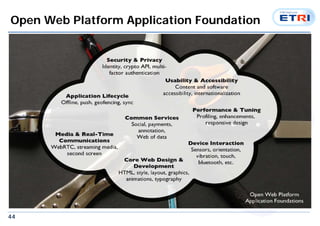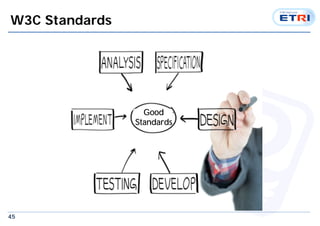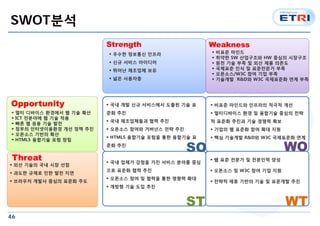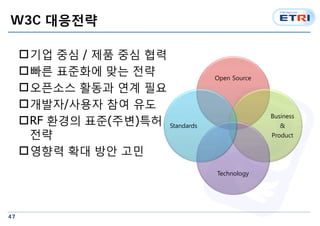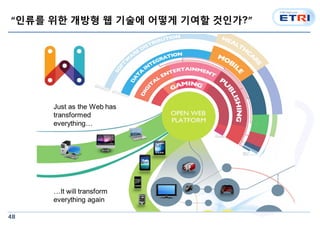W3C ????? ?? ??
- 1. W3C ?? ??? ?? ?? Jonghong Jeon ETRI, PEC Email: hollobit@etri.re.kr Blog: http://mobile2.tistory.com http://twitter.com/hollobit http://www.etri.re.kr
- 7. Agenda 1. ? ?? ?? 2. W3C ?? 3. W3C ??? ?? ?? 4. ?? 7
- 8. 1. ? ?? ??
- 9. In The Beginning ..... ? World Wide Web (Tim Berners-Lee, 1989) 9 ? universe of network-accessible information ? anyone, anywhere, anytime ? Client to server interactions
- 10. Evolution of World Wide Web 10
- 11. Evolution of World Wide Web ? 1?? (1989~1999) : ????? ??, HTML? WAP 11 ? HTML, URL, HTTP ?? ? ?? ??? ??? ? ??? ????, ?? ?? ?? ??? ???? ? ???? ?? ??? ?? ?? ? 2?? (2000~2004) : XML? ????, ??? ? ? XML(eXtensible Markup Language)? ???? ?? ??? ?? ??? ? ?? ??? ????? ???, ?????? ???? ?? ??? ?? ?? ? 3?? (2005~2009) : ? 2.0, ? ??? ??? ?? ? ??, ???, ????? ?? ??? ?? ? ??? ?2? ???? ? ?? ??? ?? ???? ??? ? ?? ??? ?? ? 4?? (2010~2014) : ? ?? ??, ???? N-Screen ?? ? ??? ? ? ??? ? ??? ??? ???? ???? HTML5? Web API? ?? ? ?? ??? ? ?? ??? ????, ???? ? ?? ? ? ?? ???? ?? ?? ?????? ?? ???? ?? ?? ? 5?? (2015~??)
- 12. Evolution of World Wide Web 1989 2000 2005 2010 2015 Web Document ????? ??, HTML? WAP 12 Web Services ????? ?? Open Web ? 2.0, ? ??? ?? Web App & APIs ? ?? ??, ???? N-Screen ?? Web of Things ?? ?? ??
- 13. Evolution of World Wide Web 13
- 14. 2. W3C ??
- 15. Organizational Structure ? Host 15 ? MIT , ERCIM , Keio University, and Beihang University ? Offices ? Australia Benelux/B©”n©”lux Brasil Deutschland und ?sterreich Espa?a France India/???? Italia Magyarorsz©óg S©”n©”gal Southern Africa Suomi Sverige United Kingdom and Ireland ”ź”╦”╦?”─”┴ ¦▓¦Ó¦Ń¦Ń¦┌¦± ?????? ????? ųą╣·?? ? ome key components of the organization are: ? the Advisory Committee, composed of one representative from each W3C Member. The Advisory Committee has a number of review roles in the W3C Process, and they elect the Advisory Board and TAG. ? the Advisory Board, an advisory body elected by the Advisory Committee ? the Technical Architecture Group (TAG), which primarily seeks to document Web Architecture principles ? the W3C Director and CEO, who assess consensus for W3C-wide decisions ? the chartered groups, populated by Member representatives and invited experts, and which produce most of W3C's deliverables according to the steps of the W3C Process.
- 18. Community Groups, Business Groups and Workshops ? These are ways that we get initial input into areas for W3C Standards work and each has its own attributes 18
- 19. Group Types ? http://www.w3.org/community/about/agreements/compare/ 19
- 20. 3. W3C ??? ?? ??
- 21. ?? ??? ?? ???? 21 ??: ???,
- 22. ?? ??? ?? ???? ? ?? ?? ? ?? ?? ?? ? IPR ?? ? ?? ??? ?? ? ?? ?? ?? 22 ?? ??/?? ?? !!
- 23. W3C ?? ? ?? ?? 23 ? ???? ??, ???/?? ? ? ?? ?? ?? ? ???? ??, ???/?? ? ? Legacy ???? ?? ?? ? (???, ??, ??? ?) ? IPR ?? ? RF(Royalty Free) !! ? ?? ??? ?? ? ???? ????? ???? ?? ? ?? ?? ?? ? ? ?? ???? ?? !!
- 24. W3C status ? Total unique number of participants: 1893 ? Total unique number of participants in good standing: 1869 ? Total number of Members with 1 or more individuals in good standing in a group: 253 24 Participants type Working Groups Interest Groups All Member represent atives 1250 548 1513 Team 40 35 49 Invited Experts 305 90 331 Total 1595 673 1893
- 25. ??? W3C ?? ?? ? 1994.10 W3C ?? ? 1995.5.19 ????(WWW-KR) ?? ? 1995.11 ???? W3C ?? ?? ? 1997.1 KNC W3C ?? ? 2002.4.1 ETRI, W3C ???? ??? ?? ? 2007. ??? ? 2.0 ?? ?? (W3C ??) ? 2007.2 SKT W3C ?? ? 2008.1 ???? W3C ?? ? 2008.3 W3C WG ?? ?? ?? (MWBP, DD) ? 2008.11 ????, ?? ??? W3C WG ?? ?? ? 2010. LG?? W3C ?? ? 2013. ???, W3C ?? ???? ?? ? 2014. HTML5 ?????? ?? (W3C ??) ? 2014.7 ????, ?? ??? W3C AB ?? ?? 25 http://www20.kr/timeline/
- 26. [1] ?? ?? - W3C ?? ?? (?? 40) 26 Google, Inc. Nippon Telegraph & 12% W3C Invited Experts 8% Microsoft Corporation 7% Mozilla Foundation 7% IBM Corporation 5% Adobe Systems Inc. Intel Corporation 5% 4% Baidu, Inc. 3% Samsung Electronics Co., Ltd. 3% University of Southampton Vrije Universiteit Oracle Corporation 1% CNR--Consiglio Nazionale delle 1% Comcast Corporation Insight Centre for Data Analytics 3% 3% 2% Universidad Polit©”cnica de Ricerche Nokia Corporation 2% Opera Software 3% Madrid 2% Mitsubishi Electric Corporation 2% Apple, Inc. British 2% Broadcasting Corporation 2% Institut National de Recherche en Informatique et en Automatique 2% Tencent 2% Fraunhofer Gesellschaft 2% 1% KDDI CORPORATION 1% MITRE Corporation 1% Electronics and Telecommunications Research Institute 1% Orange 1% Pearson plc 1% Huawei 1% Stanford University 1% Deutsche Telekom AG 1% University of Manchester 1% Yandex 1% German Research Center for Artificial Intelligence 1% International Webmasters Association 1% HP 1% NIC.br - Brazilian Network Information Center 1% Telephon e Corp. 1% ?? ??? ?? 40? ??? 54%
- 27. [1] ?? ?? - W3C ?? ?? (?? 10) 27 Google, Inc. , 165 W3C Invited Experts , 102 Microsoft Mozilla Corporation , 93 Adobe Systems Inc. , Foundation , 89 63 IBM Corporation , 65 Intel Corporation , 52 Baidu, Inc. , 42 Samsung Electronics Co., Ltd. , 42 Insight Centre for Data Analytics , 38 ?? 10? ??? 30%
- 28. [1] ?? ?? ©C ???? ?? first ? Dictation of Browser Vendor 28
- 29. [2] ?? ?? ??? ??? ?? 29 Change of W3C Recommendation Track
- 30. [2] ?? ?? ??? ??? ©C W3C CG ? A history of Community and Business Groups participation: 30
- 31. [2] ?? ?? ??? ??? ©C CG Case Study ? Responsive Images 31 ? Community Group (2012.02) ? http://www.w3.org/community/respimg/ ? Public Mailing list (2012.02) ? http://lists.w3.org/Archives/Public/public-respimg/ ? Github (2012.10) ? https://github.com/ResponsiveImagesCG/ ? Use Case (2012.10) ? http://usecases.responsiveimages.org/ ? Specifications (2013.02) ? Picture Element - http://picture.responsiveimages.org/ ? Srcset attribute - http://www.w3.org/html/wg/drafts/srcset/w3c-srcset/ ? Implementation (2013.08) ? WebKit Has Implemented srcset
- 32. [3] ???? ??? ?? 32 WHAT-WG
- 33. [3] ???? ??? ?? ©C Social Coding ? ???(GitHub, /'©└?t?h?b/[1])? ?? ???? ????? ???? ? ??? 33 ??? ?????. ?? ? ???? ?????. GitHub? ???? ??? ? ????? ?? ?? ???? ?? ????. 2009?? Git ??? ?? ? ??? GitHub? ?? ???? Git ??? ?????.[2]?? 2011?? ? ???? ?? ???? ?? ?? ?? ???? ???.[3] ? https://github.com/w3c ? https://github.com/sysapps ? Features ? Web Hosting ? Project management ? Social Coding ? Issue Tracking
- 34. [3] ???? ??? ?? - Github 34
- 35. [3] ???? ??? ?? - Github 35
- 36. [4] Open Source & Standardization Governance 36
- 37. [5] User Driven Testing ? Test The Web Forward 37 ? http://testthewebforward.org/ ? https://github.com/w3c/web-platform-tests ? https://github.com/w3c/testtwf-website ? Community-Driven & Industry-Supported ? Open-Source & Standards-Based ? Lean & Data-Driven ? Centralized & Discoverable W3C's one stop shop for Open Web Platform testing.
- 38. [6] W3C IPR Policy ©C Royalty Free 38 http://www.w3.org/Consortium/Patent-Policy-20040205/
- 39. [6] W3C IPR Policy ©C Royalty Free 39
- 40. [6] Why RF IPR ©C from IBM ? RAND vs RF 40 ? 1995-2003 ©C RAND! ? 2003- present ©C RF! ? IBM leads the world in patents ? Hard to change internal culture ? SW & HW have diff cultures w.r.t. IPR ? For SWĪŁthe key to shifting from RAND ? RF ? RF Standards ? Bigger Markets ? More $$ ? ItĪ»s a business decision! ? If standard activity is strategic, default = RF ? Glad to answer questions talk details later ? https://www.w3.org/2005/Talks/IBM-W3C-PP.pdf Source: IBM
- 41. [6] Why RF IPR ©C Google ?? 41
- 42. [6] Why RF IPR 42 Ī░???? ??? ?2(Zip2)?? ?? ?? ?? ???? ?? ??? ??? ? ????, ?? ? ??? ???? ???? ???? ?? ???? ????.Ī▒ - ??? ???, ?? ???
- 43. 4. ??
- 44. Open Web Platform Application Foundation 44
- 45. W3C Standards 45 Good Standards
- 46. 46 ? ?? ?? ?? ????? ??? ?? ? ?? ?? ? ?? ?????? ?? ?? ? ???? ??? ???? ?? ?? ? HTML5 ???? ??? ?? ???? ? ?? ?? ? ??? ???? ???? ??? ?? ? ?????? ?? ? ???? ??? ?? ? ??? ??? ?? ??? ?? ? ??? ? ??? ?? ?? ?? ? ?? ???? R&D? W3C ????? ?? SO WO ? ?? ??? ??? ?? ??? ??? ?? ?? ??? ?? ?? ? ???? ?? ? ??? ?? ??? ?? ? ??? ?? ?? ?? ? ? ?? ??? ? ???? ?? ? ???? ? W3C ?? ?? ?? ? ??? ?? ??? ?? ? ???? ?? ST WT SWOT?? Strength Weakness Opportunity Threat ? ??? ???? ??? ? ?? ??? ???? ? ??? ???? ?? ? ?? ???? ? ??? ??? ? ??? SW ????? HW ??? ???? ? ?? ?? ?? ? ?? ?? ??? ? ???? ?? ? ????? ?? ? ????/W3C ?? ?? ?? ? ???? R&D? W3C ????? ?? ?? ? ?? ???? ???? ? ?? ?? ? ICT ???? ? ?? ?? ? ?? ? ?? ?? ?? ? ??? ??????? ?? ?? ?? ? ???? ??? ?? ? HTML5 ???? ?? ?? ? ?? ??? ?? ?? ?? ? ??? ??? ?? ?? ?? ? ???? ??? ??? ??? ??
- 47. W3C ???? 47 Open Source Business & Product Technology Standards ??? ?? / ?? ?? ?? ??? ???? ?? ?? ????? ??? ?? ?? ????/??? ?? ?? ?RF ??? ??(??)?? ?? ???? ?? ?? ??
- 48. Ī░??? ?? ??? ? ??? ??? ??? ????Ī▒ 48
- 49. 49 JongHong Jeon (hollobit@etri.re.kr) +82-42-860-5333 http://mobile2.tistory.com/m http://twitter.com/hollobit

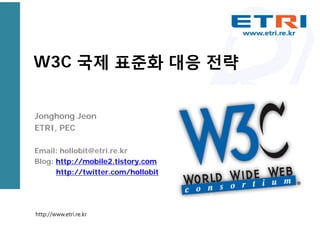

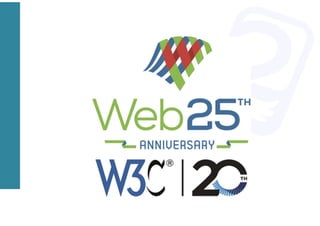
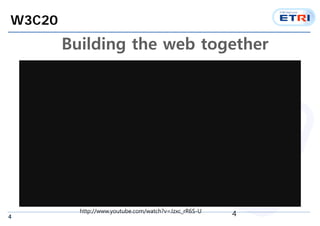
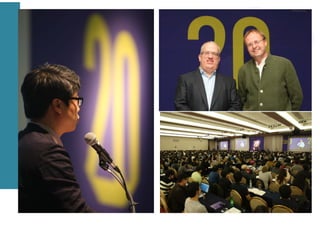
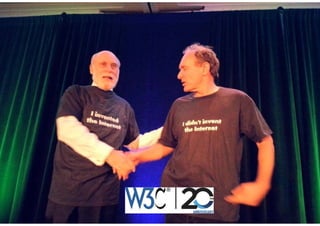
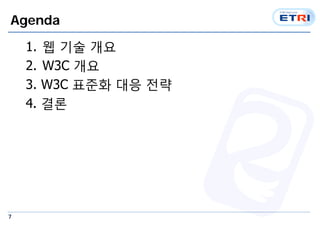

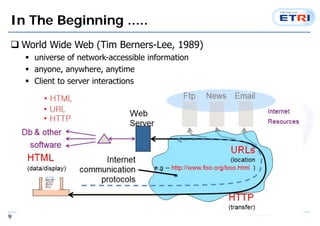
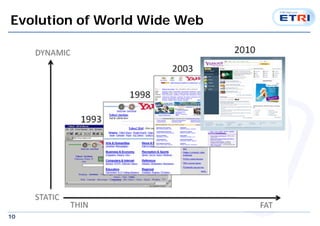
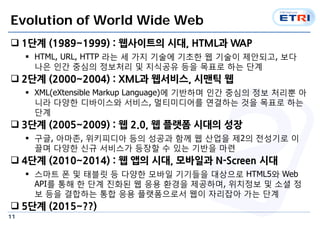
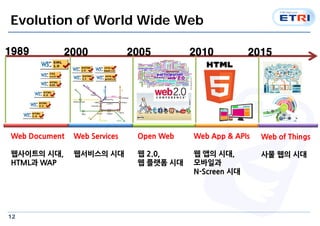
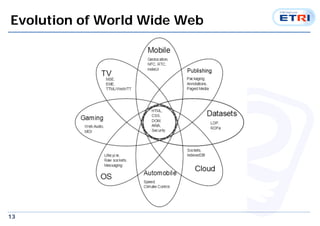

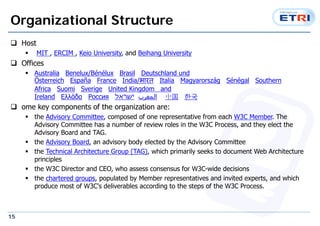
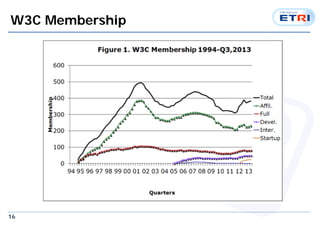
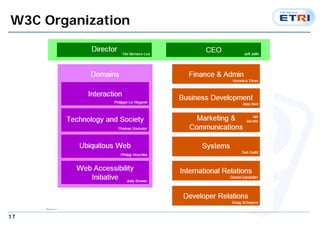
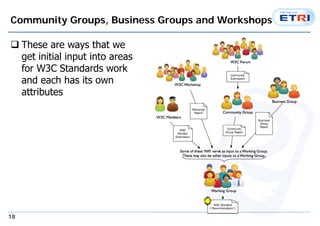
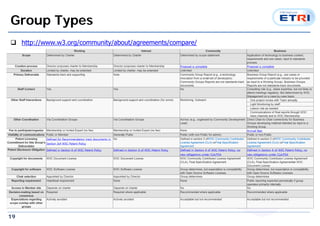
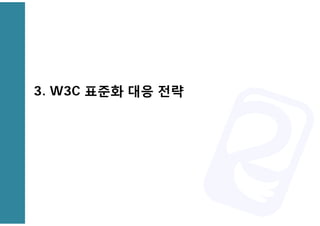
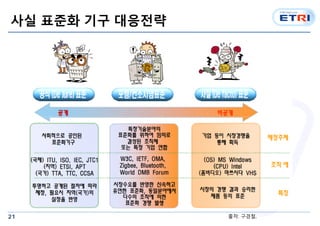
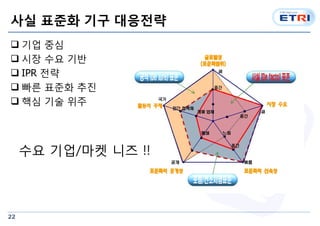
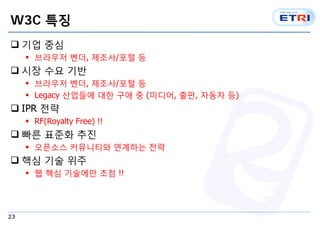
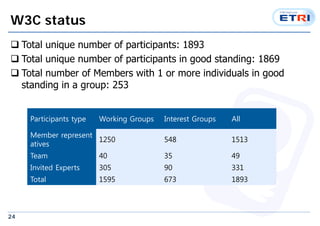
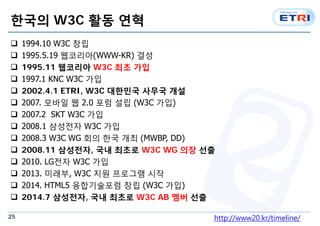
![[1] ?? ?? - W3C ?? ?? (?? 40)
26
Google, Inc.
Nippon
Telegraph
&
12% W3C Invited Experts
8%
Microsoft Corporation
7%
Mozilla Foundation
7%
IBM Corporation
5%
Adobe Systems Inc.
Intel Corporation 5%
4%
Baidu, Inc.
3%
Samsung
Electronics
Co., Ltd.
3%
University of
Southampton
Vrije Universiteit
Oracle
Corporation
1%
CNR--Consiglio
Nazionale delle
1%
Comcast
Corporation
Insight Centre for
Data Analytics
3%
3%
2%
Universidad
Polit©”cnica de
Ricerche
Nokia
Corporation
2%
Opera Software
3%
Madrid
2%
Mitsubishi
Electric
Corporation
2%
Apple, Inc.
British 2%
Broadcasting
Corporation
2%
Institut
National de
Recherche en
Informatique
et en
Automatique
2%
Tencent
2%
Fraunhofer
Gesellschaft
2%
1%
KDDI
CORPORATION
1%
MITRE
Corporation
1%
Electronics and
Telecommunications
Research Institute
1%
Orange
1%
Pearson
plc
1%
Huawei
1%
Stanford
University
1%
Deutsche
Telekom
AG
1%
University of
Manchester
1% Yandex
1%
German Research
Center for Artificial
Intelligence
1%
International
Webmasters
Association
1%
HP
1%
NIC.br - Brazilian
Network
Information Center
1%
Telephon
e Corp.
1%
?? ???
??
40?
???
54%](https://image.slidesharecdn.com/20141128-w3c-r2-141201202145-conversion-gate02/85/W3C-26-320.jpg)
![[1] ?? ?? - W3C ?? ?? (?? 10)
27
Google, Inc. , 165
W3C Invited Experts ,
102
Microsoft
Mozilla Corporation , 93
Adobe Systems Inc. ,
Foundation , 89
63
IBM
Corporation ,
65
Intel Corporation ,
52
Baidu,
Inc. ,
42
Samsung Electronics
Co., Ltd. , 42
Insight Centre for
Data Analytics , 38
??
10?
???
30%](https://image.slidesharecdn.com/20141128-w3c-r2-141201202145-conversion-gate02/85/W3C-27-320.jpg)
![[1] ?? ?? ©C ???? ?? first
? Dictation of Browser Vendor
28](https://image.slidesharecdn.com/20141128-w3c-r2-141201202145-conversion-gate02/85/W3C-28-320.jpg)
![[2] ?? ?? ??? ??? ??
29
Change of W3C Recommendation Track](https://image.slidesharecdn.com/20141128-w3c-r2-141201202145-conversion-gate02/85/W3C-29-320.jpg)
![[2] ?? ?? ??? ??? ©C W3C CG
? A history of Community and Business Groups participation:
30](https://image.slidesharecdn.com/20141128-w3c-r2-141201202145-conversion-gate02/85/W3C-30-320.jpg)
![[2] ?? ?? ??? ??? ©C CG Case Study
? Responsive Images
31
? Community Group (2012.02)
? http://www.w3.org/community/respimg/
? Public Mailing list (2012.02)
? http://lists.w3.org/Archives/Public/public-respimg/
? Github (2012.10)
? https://github.com/ResponsiveImagesCG/
? Use Case (2012.10)
? http://usecases.responsiveimages.org/
? Specifications (2013.02)
? Picture Element - http://picture.responsiveimages.org/
? Srcset attribute - http://www.w3.org/html/wg/drafts/srcset/w3c-srcset/
? Implementation (2013.08)
? WebKit Has Implemented srcset](https://image.slidesharecdn.com/20141128-w3c-r2-141201202145-conversion-gate02/85/W3C-31-320.jpg)
![[3] ???? ??? ??
32
WHAT-WG](https://image.slidesharecdn.com/20141128-w3c-r2-141201202145-conversion-gate02/85/W3C-32-320.jpg)
![[3] ???? ??? ?? ©C Social Coding
? ???(GitHub, /'©└?t?h?b/[1])? ?? ???? ????? ???? ? ???
33
??? ?????. ?? ? ???? ?????. GitHub? ???? ???
? ????? ?? ?? ???? ?? ????. 2009?? Git ??? ??
? ??? GitHub? ?? ???? Git ??? ?????.[2]?? 2011?? ?
???? ?? ???? ?? ?? ?? ???? ???.[3]
? https://github.com/w3c
? https://github.com/sysapps
? Features
? Web Hosting
? Project management
? Social Coding
? Issue Tracking](https://image.slidesharecdn.com/20141128-w3c-r2-141201202145-conversion-gate02/85/W3C-33-320.jpg)
![[3] ???? ??? ?? - Github
34](https://image.slidesharecdn.com/20141128-w3c-r2-141201202145-conversion-gate02/85/W3C-34-320.jpg)
![[3] ???? ??? ?? - Github
35](https://image.slidesharecdn.com/20141128-w3c-r2-141201202145-conversion-gate02/85/W3C-35-320.jpg)
![[4] Open Source & Standardization Governance
36](https://image.slidesharecdn.com/20141128-w3c-r2-141201202145-conversion-gate02/85/W3C-36-320.jpg)
![[5] User Driven Testing
? Test The Web Forward
37
? http://testthewebforward.org/
? https://github.com/w3c/web-platform-tests
? https://github.com/w3c/testtwf-website
? Community-Driven & Industry-Supported
? Open-Source & Standards-Based
? Lean & Data-Driven
? Centralized & Discoverable
W3C's one stop shop for Open Web Platform testing.](https://image.slidesharecdn.com/20141128-w3c-r2-141201202145-conversion-gate02/85/W3C-37-320.jpg)
![[6] W3C IPR Policy ©C Royalty Free
38
http://www.w3.org/Consortium/Patent-Policy-20040205/](https://image.slidesharecdn.com/20141128-w3c-r2-141201202145-conversion-gate02/85/W3C-38-320.jpg)
![[6] W3C IPR Policy ©C Royalty Free
39](https://image.slidesharecdn.com/20141128-w3c-r2-141201202145-conversion-gate02/85/W3C-39-320.jpg)
![[6] Why RF IPR ©C from IBM
? RAND vs RF
40
? 1995-2003 ©C RAND!
? 2003- present ©C RF!
? IBM leads the world in patents
? Hard to change internal culture
? SW & HW have diff cultures w.r.t. IPR
? For SWĪŁthe key to shifting from RAND ? RF
? RF Standards ? Bigger Markets ? More $$
? ItĪ»s a business decision!
? If standard activity is strategic, default = RF
? Glad to answer questions talk details later
? https://www.w3.org/2005/Talks/IBM-W3C-PP.pdf
Source: IBM](https://image.slidesharecdn.com/20141128-w3c-r2-141201202145-conversion-gate02/85/W3C-40-320.jpg)
![[6] Why RF IPR ©C Google ??
41](https://image.slidesharecdn.com/20141128-w3c-r2-141201202145-conversion-gate02/85/W3C-41-320.jpg)
![[6] Why RF IPR
42
Ī░???? ??? ?2(Zip2)?? ?? ?? ?? ???? ?? ??? ??? ?
????, ?? ? ??? ???? ???? ???? ?? ???? ????.Ī▒
- ??? ???, ?? ???](https://image.slidesharecdn.com/20141128-w3c-r2-141201202145-conversion-gate02/85/W3C-42-320.jpg)

